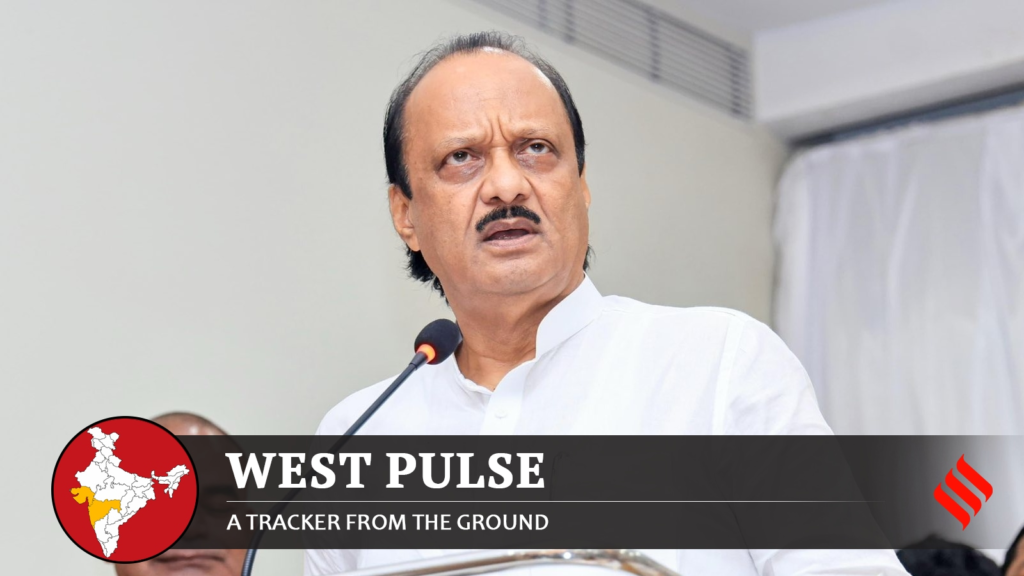970x125
From speaking out in support of Maharashtra’s Qureshi community against self-styled cow vigilantes, to questioning moves by some municipalities to order meat shops shut on Independence Day, Deputy Chief Minister Ajit Pawar has made visible efforts to project himself and his NCP – which is in power in the state in alliance with the BJP and Shiv Sena – as unwaveringly secular.
970x125
This careful balancing act is important for Pawar, with the NCP – over its long association with the Congress – traditionally enjoying the support of minority communities. The vegetarianism identified with the BJP also runs contrary to the NCP’s Maratha vote bank.
The Mahayuti coalition, for example, has only three Muslim MLAs, of whom two belong to the NCP. Several of Pawar’s key allies, such as Sunil Tatkare, represent constituencies where the Muslim vote is critical.
To political observers who have seen Pawar grow in his uncle Sharad Pawar’s shadow, before wresting the NCP from him, the younger leader’s tightrope walk is also in line with his “pragmatic and transactional” politics, not especially tied to ideology.
The mentorship of Pawar Senior, whose friendships cut across party lines – helping sustain his fruitful and long political career – has played a substantial role in this.
In the days following the BJP-led Mahayuti alliance’s sweeping victory in the 2024 Maharashtra Assembly elections, winning 235 out of 288 seats, Ajit Pawar had gone out of his way to soothe apprehensions of the minority community. In anticipation of a Maha Vikas Aghadi victory, the Muslim leadership had openly endorsed the coalition, and feared marginalisation under the Mahayuti.
Early this year, in a direct message to the minority community, Pawar said: “No one will face injustice while I’m in government… I am a man of my word.” He also addressed a Minority Community Confidence Meeting, where he said: “Some people try to create fear in the minds of the community for their vested political interests. I assure you all that we are making efforts to run the government along with you. It is the responsibility of our government to provide security to every individual in the state.”
Earlier this month, Pawar met a delegation of the Qureshi community after they suspended cattle trade across the state over “growing harassment” and “vigilante violence”. His office ensured the meeting was widely publicized, with a press release issued by the state’s Public Relations Department. “No injustice will be allowed against the traders of this community (Qureshi) and the farmers who transport animals,” Pawar told the delegation.
Now, Pawar has spoken out against municipal corporations shutting down slaughterhouses and meat shops on Independence Day. Questioning the logic of the directives, he said Tuesday: “While it is important to respect public sentiments on religious occasions like Ashadi Ekadashi or Mahavir Jayanti, there is no justification for banning meat or non-vegetarian food on days like Maharashtra Day, Independence Day, or Republic Day.”
While sections of the Muslim community have welcomed Pawar’s words, many fear it is all optics, pointing out that despite Pawar’s backing to the Qureshi community, there has been no resolution of their grievances. The strike by meat traders and cattle transporters continues.
“Ajit Pawar does not control the ministries that regulate our trade. Moreover, there has been no written communication or administrative action that suggests any real change… We need tangible outcomes to believe the government is serious,” said Mohammad Ali Qureshi, president of the Bombay Suburban Beef Dealers’ Association.
Similarly, while Pawar spoke out against municipal corporations shutting down slaughterhouses and meat shops on Independence Day, none of the orders has been reversed.
Justifying the ban, the BJP has claimed that directives such as this have been issued since 1988.
The apparent free rein within the NCP to leaders such as MLA Sangram Jagtap, whose incendiary statements were alleged to have led to communal tensions and recent violence in Pune’s Yavat area, also makes its supporters apprehensive.
In his initial remarks, while sharing the stage with Jagtap, Pawar said: “Sangram slips up during speeches sometimes. Let’s not slip now. We need to take everyone along.”
Later, Pawar promised to “ask him (Jagtap) to explain”. But no disciplinary action followed.
NCP Maharashtra vice-president Saleem Sarang admitted that statements such as Jagtap’s hurt the party. “We have always strived to take everyone along, including our Muslim brothers and sisters… I urge leaders to stop making such remarks immediately… or our Muslim supporters will lose faith in the party.”
A Muslim NCP leader sympathised with Pawar’s position. “These are tough times. Pandering to a Muslim vote base is politically risky. But at least Pawar is offering the optics that he cares – something no other leader in the ruling establishment is even attempting. It may not change the situation on the ground, but he is still taking a significant risk,” the leader, who did not wish to be named, said.
However, others remain sceptical about how far optics alone can work. “Yes, Ajit Pawar’s presence in the government offers some hope to minorities that their concerns will at least be voiced. But his inability to stop anti-Muslim rhetoric from his own MLAs, or reverse decisions he publicly criticizes, undermines that hope. It makes his secular stance look more performative than principled,” says Irfan Shaikh, a Malegaon-based social activist.
970x125

